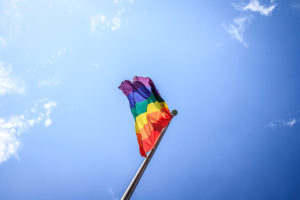Why Every Parent Should be a Gay-Friendly Parent

Gay author and political commentator Andrew Sullivan has said that, when he came out to his family, his father wept. When he regained his composure, his father explained that he was just imagining what Andrew had been through and was sorry he wasn’t there for him.
In his book, Always my Child: A Parent’s Guide to Understanding and Supporting Your Gay, Lesbian, Bisexual, Transgender or Questioning Son or Daughter, Kevin Jennings, a former member of the Obama administration, related his own experience. “I did not come out until I had moved far enough away from home to feel safe to do so,” he wrote. “But I often think back about how different my life would have been if I had been raised in an open, accepting atmosphere. In school, I was tormented, teased, and beaten. But I never felt I could come home and tell my family why this was happening to me or ask them for help.”
Robert Bernstein, author of Straight Parents, Gay Children: Keeping Families Together, told how his family came to grips with having a lesbian daughter. In his book, he expressed “an overriding regret” that he and other adults in her life were not there for her when she was struggling with feelings she didn’t understand.
I respect Parents and Friends of Lesbians and Gays (PFLAG), and I think we should expand on a statement that appears on some of its chapters’ websites. Among their “Frequently Asked Questions” is this: “Should I talk to a loved one about his or her sexual orientation or gender identity before the person talks to me?” The answer given is, “It’s seldom appropriate to ask a person, ‘Are you gay?’ Your perception of another person’s sexual orientation (gay or straight) or gender identity (male or female) is not necessarily what it appears.”
It assumes the person referred to is a casual acquaintance whose sexual orientation shouldn’t concern us. But the question is about talking to a loved one! Although “Are you gay?” is not the best way to introduce the subject, I urge parents not to wait until a family member brings it up, as that may happen only after they have suffered in silence for years.
What if all parents were open about various kinds of relationships as soon as their kids were old enough to know about romantic love? How different would the world be if all children were raised with the knowledge that they could love anyone, that they didn’t have to conform to stereotypical gender roles, and that everyone deserves respect?
Start the dialogue early
Some parents believe that raising children by shielding them from learning about lesbian, gay, bisexual, and transgender individuals will guarantee they’ll be heterosexual and cisgender. It won’t. Their sexual orientation and gender identity will occur naturally, regardless of parental or outside influences.
CNN anchorman Anderson Cooper said, “I’ve always known I was gay from the time I was a little kid. I can’t remember a time when I wasn’t aware of it, even before I knew what it was or the name of it.”
Out of fear that their parents won’t accept them as they are, many gay kids hide their feelings for a long time. If open discussions don’t happen until puberty, that’s about 10 years too late. And if you wait until you hear the words, “Mom, Dad, I’m gay,” it may be much too late to ease the pain of growing up gay. Imagine what it must feel like for a child who knows he’s attracted to his own gender to sit in church and hear the pastor call him “an abomination.”
Gay kids often suffer emotionally, do poorly in school, or cope with alcohol or drugs. They may be bullied. They are three times more likely to attempt suicide. And if they do end their lives, their parents may never know that their sexual orientation was the underlying cause—or perhaps learn of it in a suicide note.
What to say
Don’t try to have an adult conversation with a seven-year-old. Talk to children at their age level. And don’t buy into the hysteria over primary-school children supposedly being exposed to “sex education.” Books like My Two Mommies or Daddy’s Roommate are about love, not sex, and are no more harmful to a child’s psyche than stories like Cinderella.
Include LGBTQ friends or relatives in your family gatherings, and show that you respect their relationships. Don’t be afraid of “recruiting,” as your children will instinctively know whether your LGBTQ acquaintances will become role models.
Children will readily accept homosexuality and a variety of gender identities as normal if their parents do.
Teach your children that everyone deserves a chance at love. Communicate honestly, and let them know you are supportive of LGBTQ people. Whether your kids are destined to be straight, gay, lesbian, bisexual, transgender or asexual, you will have done your job well if they grow up to be happy, well-adjusted and tolerant.
